Key takeaways
- Pragmatism emphasizes practical outcomes over abstract theories, encouraging a hands-on approach to learning and decision-making.
- Truth is dynamic and evolves through experience, challenging fixed beliefs and allowing for adaptability in understanding.
- Applying pragmatism involves testing ideas in real-life situations, making education a continual experiment focused on tangible results.
- Embracing uncertainty and refining values through practical experiences fosters personal growth and enhances critical thinking.
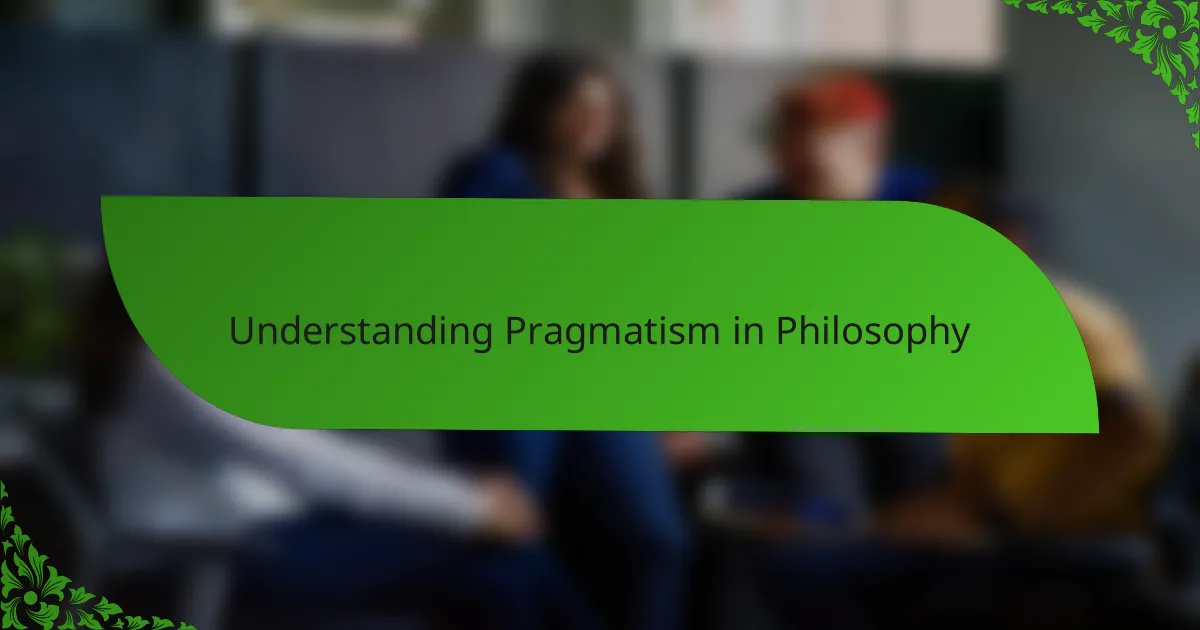
Understanding Pragmatism in Philosophy
Pragmatism, to me, always felt like philosophy that rolls up its sleeves—focused less on abstract theories and more on what actually works in daily life. I remember first encountering it during a confusing period when questions like “What’s the point of all this thinking?” haunted me. Pragmatism’s insistence on practical outcomes spoke directly to my restless mind.
Have you ever wondered why some ideas stick while others just fade away? Pragmatism answers this by suggesting that the truth of an idea depends on its usefulness and its ability to solve problems, not just on theoretical consistency. This perspective shifted how I approached not only philosophy but everyday decisions, making me realize that thinking isn’t just for pondering—it’s a toolkit for living.
Embracing pragmatism means accepting that knowledge isn’t fixed; it’s always evolving with experience. This fluidity resonated with me emotionally, especially when I faced uncertainty. It was liberating to think that being “right” isn’t about clinging to absolutes but about adapting and improving based on real-world results.
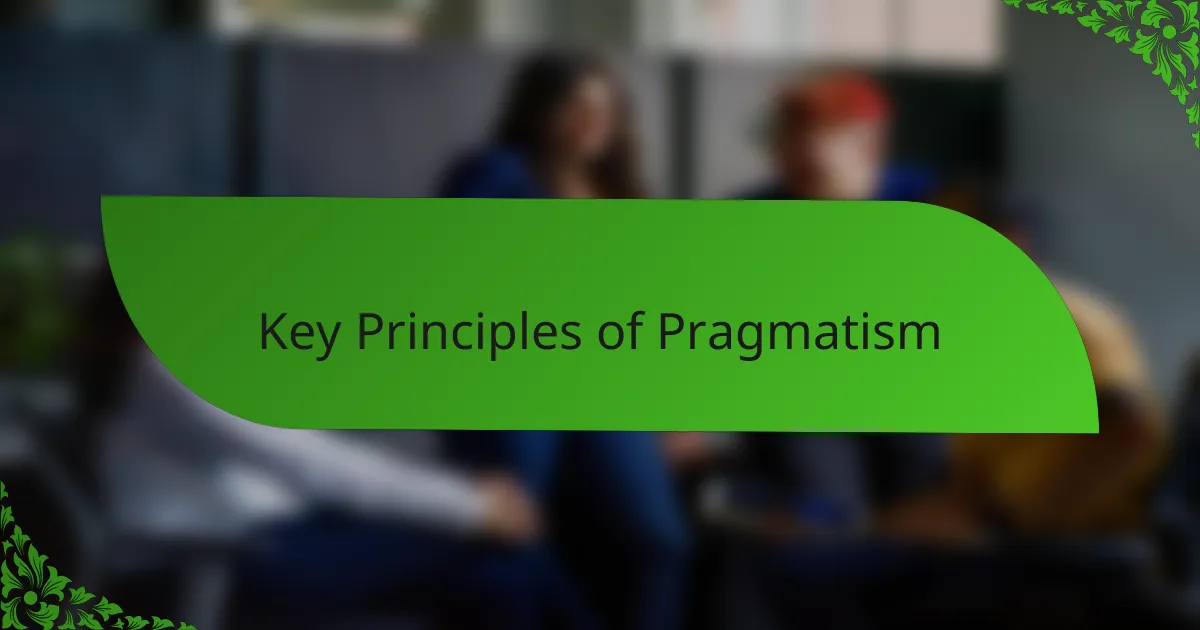
Key Principles of Pragmatism
One principle that stood out to me early on is that beliefs must be tested through experience. It’s not enough for an idea to sound good on paper; it has to prove itself in action. I recall a time when I applied this by experimenting with different study methods—instead of sticking to one, I kept what worked and dropped what didn’t, exactly like pragmatists suggest.
Another core idea is that truth is not a stagnant absolute but something that unfolds over time. This always challenged me. Have you ever held a strong conviction only to see it shift as life threw new situations your way? That’s pragmatism teaching us that knowing is dynamic, shaped by ongoing practical consequences.
Lastly, pragmatism stresses the importance of focusing on outcomes rather than mere intentions. I found this principle particularly grounding when managing projects at work. It made me rethink how I evaluate success—not by the effort alone but by the tangible results that follow, reminding me why this philosophy feels so down-to-earth and useful.
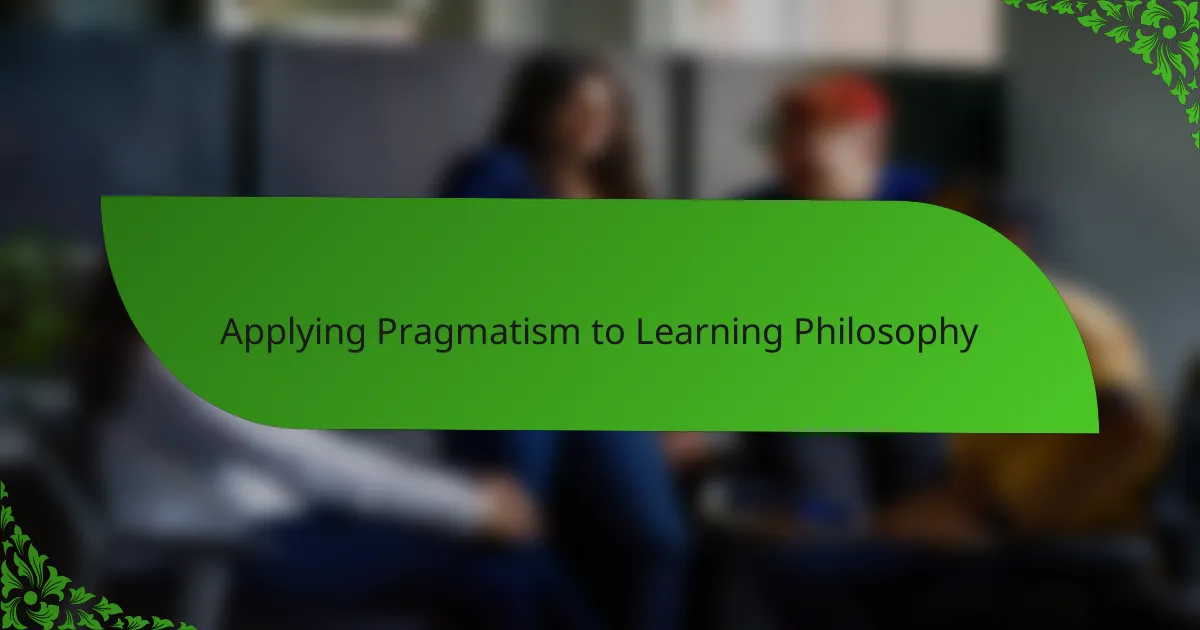
Applying Pragmatism to Learning Philosophy
When I started applying pragmatism to learning philosophy, I stopped getting lost in endless debates over abstract definitions and instead asked, “How can this idea help me understand the world better right now?” This shift made studying philosophy feel more alive and relevant, like I was testing ideas in my own life lab rather than just reading dusty textbooks.
Sometimes, I’d wrestle with complex theories and wonder if I was missing something deeper. Then I’d remind myself of pragmatism’s focus on outcomes—it’s about whether the idea changes how I think or act, not whether it fits some perfect logical puzzle. This gave me permission to move forward without paralysis, accepting that philosophy is a tool for living, not just a set of rules to memorize.
I also found that practical experimentation became a powerful learning habit. For example, when exploring ethical theories, I’d reflect on real decisions I made and see which ideas actually guided me well. Have you tried testing philosophical concepts in your daily choices? It’s surprising how much clearer and more meaningful philosophy becomes when you see it in action, rather than just in theory.
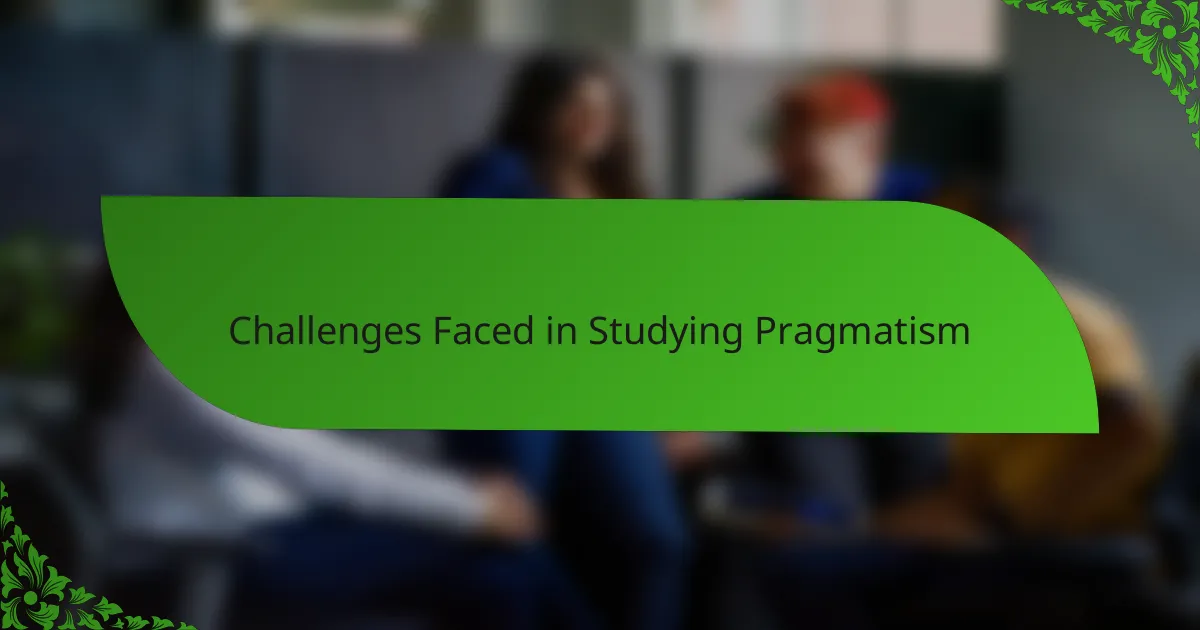
Challenges Faced in Studying Pragmatism
Sometimes, grappling with pragmatism felt like trying to catch a moving target. I often wondered, how can truth be so fluid without feeling unstable? This challenge pushed me to embrace uncertainty, even though it was uncomfortable at first.
Another hurdle was separating pragmatism from other philosophical traditions that seemed rigid and absolute. It took me a while to shift my mindset—especially when years of learning had trained me to seek definitive answers. Did I ever get frustrated? Absolutely, but that frustration turned into curiosity about the evolving nature of knowledge.
I also struggled with applying pragmatism consistently in daily life. There were moments when practical results clashed with deeply held beliefs, leaving me torn. Have you ever faced that? I learned that pragmatism isn’t about abandoning principles but about testing and refining them in real situations, which felt both challenging and rewarding.
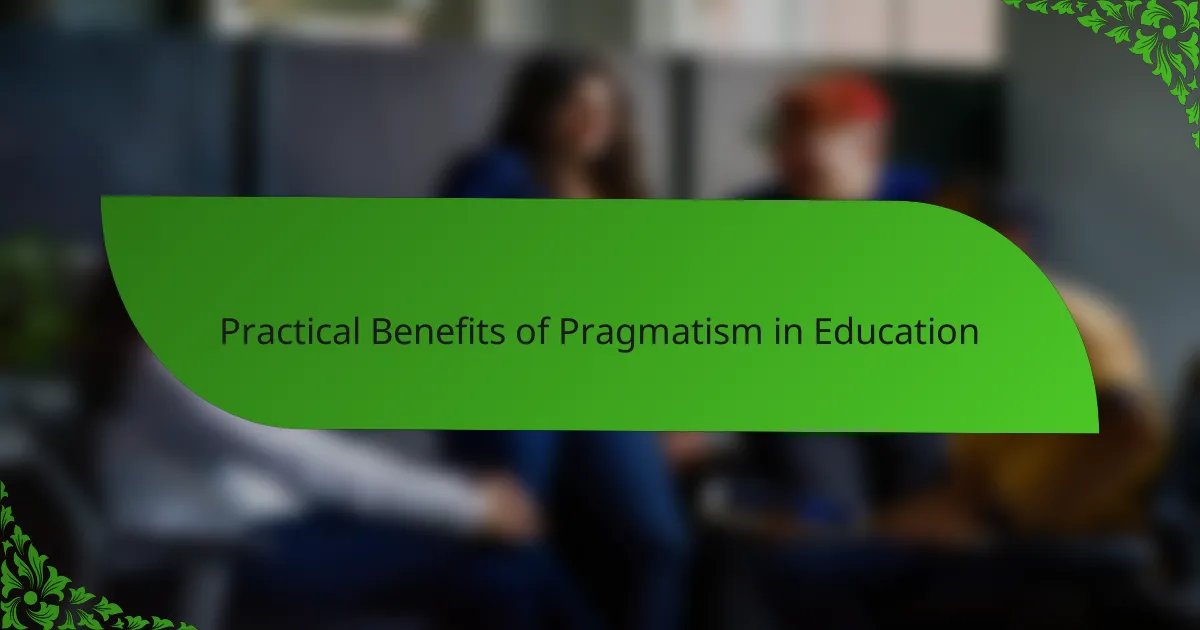
Practical Benefits of Pragmatism in Education
One of the biggest practical benefits I’ve experienced with pragmatism in education is how it encourages active learning. Instead of passively absorbing information, I found myself constantly testing ideas, asking, “Does this actually help me understand or solve a problem?” This hands-on approach made lessons stick in a way that traditional methods never did.
Have you noticed how theory sometimes feels disconnected from real life? Pragmatism bridges that gap by valuing knowledge that produces results, not just abstract concepts. In my own education journey, focusing on outcomes meant I could tailor my learning to what really mattered—skills and insights that made a tangible difference.
What’s more, pragmatism turned education into a kind of ongoing experiment. I learned to view mistakes not as failures but as clues guiding me toward better methods. This mindset took so much pressure off and made learning feel more natural and flexible, which I believe is a game-changer for students and educators alike.
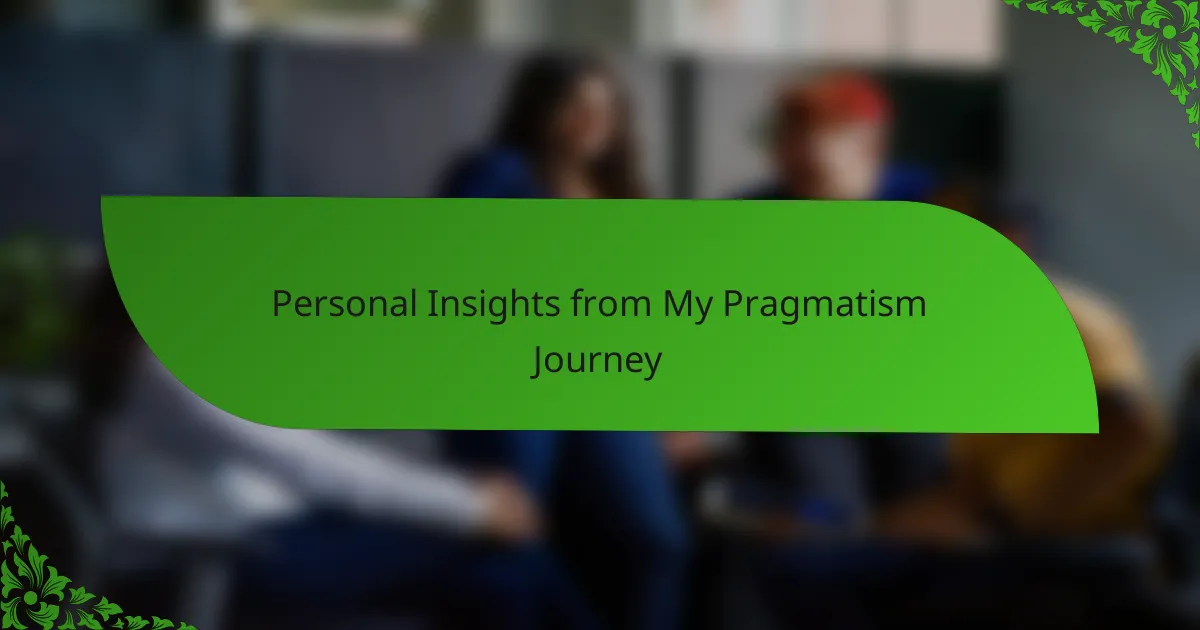
Personal Insights from My Pragmatism Journey
What hit me most deeply on this journey was how pragmatism taught me to trust experience over theory alone. I remember wrestling with the temptation to overthink every idea, then deciding instead to “test it out” in real life. That shift felt like stepping off shaky ground and onto something solid and, frankly, freeing.
Have you ever noticed how some beliefs lose their grip when faced with new challenges? I certainly have. Pragmatism made me more comfortable with that discomfort, showing me that changing my mind isn’t weakness—it’s progress. This insight transformed my relationship with knowledge, making it less about defending positions and more about growing.
At times, I struggled with balancing practical outcomes against my deeper values. It wasn’t easy admitting that some ideas I cherished didn’t hold up in practice. But pragmatism’s gentle insistence on testing everything honestly helped me refine what truly matters, turning inner conflict into clarity. Isn’t that what philosophy should ultimately do—help us live better, more thoughtful lives?

Tips for Applying Pragmatism Daily
One thing I’ve found useful in applying pragmatism daily is to ask myself, “What’s the practical impact of this choice right now?” It’s easy to get stuck in overthinking, but focusing on real-world consequences helps me move forward with clarity instead of hesitation.
I also try to stay flexible when outcomes don’t match expectations. Have you ever been surprised by how things turned out differently than planned? Embracing that unpredictability as part of the learning process keeps me from feeling defeated and instead invites curiosity about what to try next.
Lastly, I remind myself that testing ideas doesn’t mean abandoning values; it means refining them. For example, when a deeply held belief clashed with results, I didn’t give up on it but adjusted my approach. This ongoing “trial and error” mindset has made pragmatism less of a theory and more of a trusted companion in daily decisions.